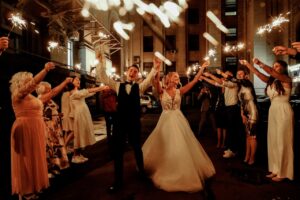The World of Traditional Indian Weddings
Indian weddings are known for their opulence, vibrant colors, and cultural significance. Steeped in rich traditions that date back centuries, these weddings are a celebration of love, family, and unity.
Join us on a captivating journey into the heart of a traditional Indian wedding and experience the magic that unfolds.
The Pre-Wedding Festivities
A traditional Indian wedding is not limited to a single day but is a series of festivities that can last for days or even a week.
The pre-wedding ceremonies begin with the engagement or “Roka” ceremony, where the couple officially declares their intention to marry. This is followed by the “Mehndi” ceremony, where intricate henna designs are applied to the bride’s hands and feet, symbolizing beauty and good fortune.
The “Sangeet” ceremony is a night of music and dance, filled with joyful performances by family and friends. It is a time for celebration, as everyone comes together to showcase their talent and revel in the joyous atmosphere.
The Wedding Rituals
The wedding day itself is an elaborate affair, starting with the “Baraat,” the groom’s grand procession to the wedding venue accompanied by his family and friends. The groom arrives on a decorated horse or in a luxury car, and the procession is accompanied by lively music and dancing.
The bride, adorned in a breathtakingly beautiful wedding attire, awaits the arrival of the groom in the “Mandap,” a decorated canopy under which the wedding rituals take place. The ceremony is conducted by a priest and includes the exchange of garlands, the tying of the auspicious wedding knot known as “Mangalsutra,” and the circling of the holy fire, symbolizing their eternal union.
The post-wedding rituals
After the wedding ceremony, the couple seeks blessings from their elders by touching their feet. This is followed by the “Vidaai” ceremony, where the bride bids farewell to her family and begins her new journey with her husband. It is an emotional moment filled with tears of joy and bittersweet farewells.
The celebrations continue with the “Reception,” a grand event where family, friends, and acquaintances come together to congratulate the newlyweds. The couple is welcomed with songs, dances, and heartfelt speeches, making it a night to remember.
A traditional Indian wedding is a captivating fusion of rituals, emotions, and celebrations. From the colorful pre-wedding festivities to the solemn wedding rituals and the joyous post-wedding celebrations, every moment is filled with love, happiness, and cultural significance.
It is an experience that leaves a lasting impression and creates cherished memories for a lifetime.
The history of Indian weddings
For centuries, the traditions of a traditional Indian wedding have been deeply ingrained in the culture and have stood the test of time. These rituals and customs have been passed down from generation to generation, preserving the essence of Indian weddings throughout history.
The origins of these traditions can be traced back thousands of years to ancient Indian scriptures and texts. The Vedas, the oldest religious texts in Hinduism, mention various wedding rituals and ceremonies, indicating that these practices have been a part of Indian society for over 3,000 years.
One of the oldest and most significant traditions is the exchange of garlands during the wedding ceremony. This practice symbolizes the acceptance and union of the couple and is believed to have originated in ancient Vedic times.
Similarly, the tying of the “Mangalsutra,” the auspicious wedding necklace, is a tradition that has been followed for centuries. It is a symbol of marital commitment and is said to bring good luck and protect the couple from evil forces. This tradition finds its roots in the ancient customs of the Indian subcontinent.
The elaborate pre-wedding ceremonies, such as the Mehndi and Sangeet ceremonies, also have a long history. Mehndi, the application of henna designs on the bride’s hands and feet, is believed to have originated in ancient Egypt and was brought to India by the Mughals. The Sangeet ceremony, a night of music and dance, has its roots in the traditional folk songs and performances that have been a part of Indian culture for centuries.
Throughout the years, these traditions have evolved and adapted to the changing times while still holding deep cultural and religious significance. While modern influences and Western wedding elements have also found their way into Indian weddings, the core traditions remain intact, reflecting the rich cultural heritage of the country.
The traditions of a traditional Indian wedding have been practiced for thousands of years, with their origins rooted in ancient scriptures and cultural practices. These rituals have stood the test of time and continue to be an integral part of Indian weddings, preserving the cultural heritage and deep-rooted values of the society.


